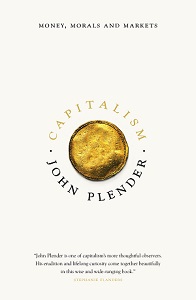Capitalism: Money, Morals and Markets by John Plender, London: Biteback Publishing, 2015, 334 pages.
The efficiency of capitalism was once widely questioned. In addition to charges that capitalism was ethically dubious because it seemed to make virtues out of greed and indifference to others, it also seemed inherently prone to booms and busts in a way that planned economies were not. But as the horrors perpetrated in the Soviet Union and elsewhere became known, true believers in the collectivist dream and many of their fellow travelers were forced to rethink their positions. Was systematic and frequently brutal suppression of dissent endemic to such rigidly controlled systems? And could it also be true that instead of liberating workers, those systems kept them impoverished? A consensus developed that capitalism "delivered the goods." Yet many people remain troubled by capitalism's ethical underpinnings and believe that the worst of its excesses must be tempered by a good deal of state intervention to keep people and businesses from running amok.
In Capitalism: Money, Morals and Markets, John Plender, a columnist for the Financial Times who once worked in London's financial district, seeks to explain why capitalism, despite its many successes, continues to command "such uneasy support." He employs a wide range of sources to examine "many of the great debates about money, business, and markets not just through the eyes of economists and business people, but through the views of philosophers, politicians, novelists, poets, divines, artists, and sundry others."
Sometimes this approach works. The people he quotes, almost always at great length, usually are on point and yield novel historical insights. At other times, the approach falters. The sourcing can seem gratuitous and distract from the narrative. More problematic than the extensive quotations he uses to put into context his own arguments are some of the arguments themselves. Two in particular stand out. First, he characterizes capitalism as something it isn't. Second, his criticism of the economics profession is too strong.
People differ on the definition of capitalism. For some, it's a system of exchange unfettered by government intervention. For most, though, capitalism is defined less narrowly. The market is the principal instrument through which goods are allocated, but it's not the only one. There is room for government action to alleviate poverty and to provide education, among many other services — what believers in laissez-faire might call a "mixed economy." Plender certainly agrees that ample state provision of services is consistent with capitalism. Indeed, he thinks it's essential in order to fill in where markets fail and to keep the system sustainable.
But the overwhelming sense one gets throughout the book is that Plender believes that a dominant — and perhaps the dominant — characteristic of modern capitalism is an oversized banking system dominated by a few very large institutions that have unfairly benefited from government support and whose executives are overcompensated relative to their performance. It's hard to argue that policymakers have not made mistakes in the way they have treated the banking industry. But insofar as this is true, Plender's complaint is with crony capitalism, not market capitalism. That the two have become so widely conflated is a serious problem for advocates of the latter.
As for the economics profession, Plender writes that "much of the instability that currently afflicts the world economy is a direct reflection of an aberrant turn in the direction taken by academic economics over the past sixty years or so." Further, economists' "modelling activity is rooted in a form of deductive reasoning reminiscent of the medieval schoolmen. The underlying assumptions belong to the world of fantasy." On the first charge, he argues that a belief in market fundamentalism among economists, many of whom have made their way into policymaking in either an official or advisory capacity, laid the groundwork for the financial crisis of 2007-2008 and what he predicts will be "a further and more damaging crisis in due course." But it's hard to see how a doctrinaire faith in markets is to blame, as the economy has become, on balance, more regulated, not less regulated, over the past 60 years. And in the case of the financial sector, most proponents of the efficient markets hypothesis, which Plender derides, would like to see institutions bear the true costs of their mistakes, imposing discipline on them where not enough currently exists.
As for the second charge, economists probably would benefit from more fully appreciating insights from related disciplines, but to say that their work is fantastical goes too far. There is good reason why assumptions are often oversimplified — and a lot of useful work has come from models with admittedly unrealistic assumptions.
This review has been largely critical. Is it because Plender has written a bad book? No. It's because he could have written a better one. He is a person of vast learning and talent. Would that most of the book resembled this graceful and discerning passage from the closing chapter: "[I]t is the efforts of business people working within a market system that have lifted millions from poverty all across the world over the past two and a half centuries. It would take far worse than anything capitalism has inflicted on the world so far to outweigh that enormous benefit on any true set of scales."




